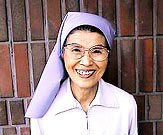Please find below an interview held with a sister who is on missionabroad in 1999.
Tell us about Taiwan.
The son of Chiang Kai-shek was the first man to propagate Democracy in Taiwan, and when his successor (who was Taiwanese) became the Governor-general, the country started to appreciate the freedom brought about by this new overnment's policies.
The Taiwanese appear to have a good impression of the Japanese even though they were under the occupation of Japan for a period of time. As far as I know, the people here are nice as well as kind. It is disappointing though, that the younger people have become morally corrupt. Actually, I saw the same phenomenon in Japan a little while ago.
Why did you become a missionary?
In 1965 I swore into the service, and then I was sent out on mission. Two of us visited some houses in our neighborhood introducing the (Roman Catholic) church and its books. One day my partner compania, said she wished to go abroad on mission. I said to her that I would like to go, too. Although, I was not as enthusiastic as her about it I told the senior at our regular meeting, "If it is the Lord's will, I would go".
If the senior asked me to go to the Nagasaki branch, I would have said "Yes" and gone there. Without hesitation though, I said I would go to Taiwan. I had absolutely no worries, and approached my assignment with obedience and ease. However, I think, if I were given the same task now, Iwouldn't be able to see it through.
Sr. Uchino (currently, she is in Akasaka, Tokyo) was sent to Taiwan before me. I was sent there after finishing one-month of family mission work in Takamatsu. One sister who swore into the service at the same time as me was sent to Korea. During my mission in Taiwan I have studied the language.
Initially, the Taiwan branch belonged to the Philippine province. There were three Italian sisters, seven to eight Filipino sisters and two Japanese sisters, Sr. Uchino and myself. However, the number often changed as we were continuously traveling back and forth between Taiwan and the Philippines. Later, Sr. Irene conti, a Provincial Mother of Japan, took over the responsibility of Taiwan and Australia and then Sr. Miyata joined us.
Would you tell us about the kind of activities you do now in Taiwan?
We have branches in Taipei, Kaoshun and Taichu. In Taipei, there is a Provincial Mother and we produce tapes, print books and run a bookstore. We also have bookstores in Kaoshun, Librelia, and Taichu. Additionally, we do displays and exhibit on sale at schools and churches. We only have three sisters so we can only do a display/an exhibit on sale once a month at night meetings.
In Taiwan, people are mostly Buddhist, about 3% are Roman Catholic and the rest worship native/common religions. In my opinion, it seems difficult for people here to convert Catholic. Like Japan, the publications we have here are mostly books for Catholic people, and few of them are for mission purpose.
How did you feel about Japan during your last visit?
Well, of course I feel at home, this is my native country, but I also feel I will not be able to catch up with its progress. I guess, it's hard to judge whether progress and change is good or bad.
I hope that I will continue to do my best and to pray.
Translated into English by Chieko Sekine from the original Japanese text written by Sr. Murayama.
